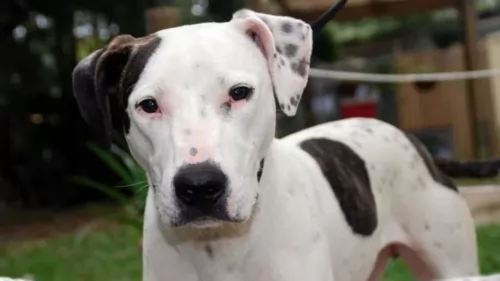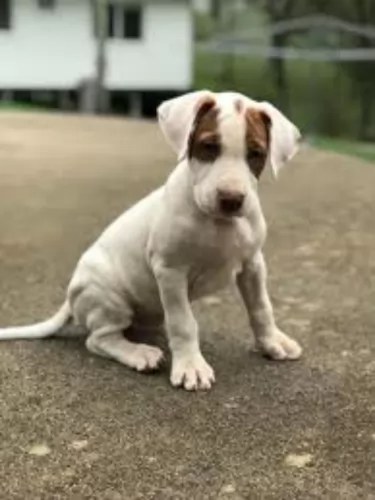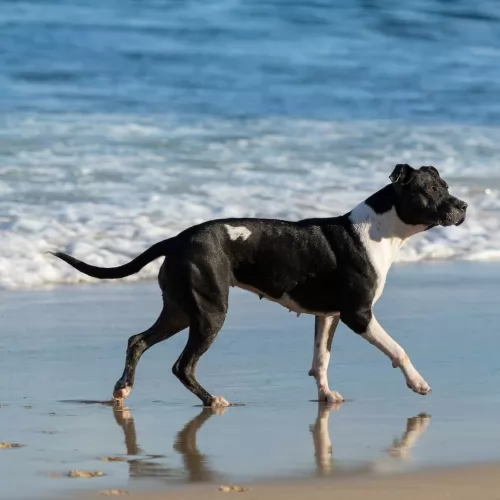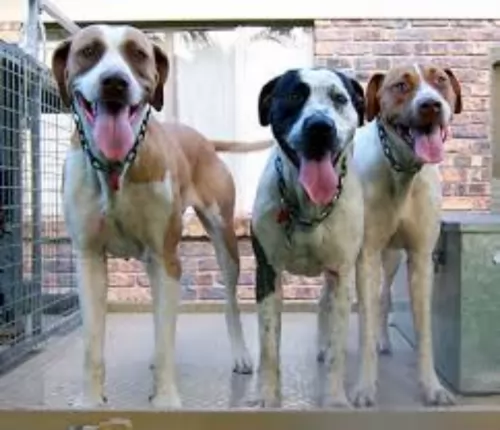 Petzlover
PetzloverBull Arab is originated from Australia but Cordoba Fighting Dog is originated from Argentina. Bull Arab may grow 7 cm / 3 inches higher than Cordoba Fighting Dog. Both Bull Arab and Cordoba Fighting Dog are having almost same weight. Both Bull Arab and Cordoba Fighting Dog has almost same life span. Both Bull Arab and Cordoba Fighting Dog has almost same litter size. Both Bull Arab and Cordoba Fighting Dog requires Low Maintenance.
 In the 1970’s feral pig hunters wanted a dog that could be aggressive in finding and capturing the pigs. The hunters crossed the German Shorthaired Pointer, the Bull Terrier and the Greyhound to develop the Bull Arab. It is believed that the hybrid is at least 50% Bull Terrier. It is also possible that there is some Doberman, Mastiff, Great Dane and/or Pointer in the hybrid as well.
In the 1970’s feral pig hunters wanted a dog that could be aggressive in finding and capturing the pigs. The hunters crossed the German Shorthaired Pointer, the Bull Terrier and the Greyhound to develop the Bull Arab. It is believed that the hybrid is at least 50% Bull Terrier. It is also possible that there is some Doberman, Mastiff, Great Dane and/or Pointer in the hybrid as well.
The job of the Bull Arab is to hunt out the feral pigs, grab one by the ear and hold it until the hunter arrives. They have a strong sense of smell and that is how they find the pigs.
Mike Hodgens, an Australian, developed the hybrid and added some Bloodhound as well to get that ability to smell out the pigs at great distances. They are also capable of catching buffalo and cattle. Some Australians use the breed in cattle or buffalo ranching. They are registered with the DRA or Dog Registry of America, Inc.
The Cordoba Fighting Dog is believed to be an extinct dog breed, but research will reveal that there are still those who believe that some of these dogs do still exist.
The dog was regarded as an aggressive, fighting dog and was a crossbreed of the Mastiff, Bull Terrier, Boxer and Bulldog.
Known also as the Argentine Fighting Dog or the Perro de Presa de Cordoba, this dog comes from Argentina where it was used for dog fighting, hog hunting as well as being a guard dog. It is thought that it became extinct in the 20th Century.
Breeders in Cordoba worked at developing a new fighting breed of dog based on the Bull Terrier. The breed became known as the Perro de Presa de Cordoba or Fighting Dog of Cordoba. He resembled the Bull Terrier and came in shades of fawn and brindle, although Argentine fanciers preferred the plain white dogs.
Over breeding for white coated dogs led to skin problems and other health problems, making it that except for fighting, the dog wasn’t in demand elsewhere. As fighting of dogs became more frowned on, the dog became extinct.
 Mike Hodgens succeeded in developing a powerful, well built dog. The Bull Arab has a powerful head and muzzle. He has moderate length drop ears and bright eyes that match the color of his coat. His chest is neither shallow nor deep and his back is straight and strong. Their tails are tapered and pointed yet the base is thick. They are a double-coated dog. They can be white with black, tan or liver, flecked or bicolor.
Mike Hodgens succeeded in developing a powerful, well built dog. The Bull Arab has a powerful head and muzzle. He has moderate length drop ears and bright eyes that match the color of his coat. His chest is neither shallow nor deep and his back is straight and strong. Their tails are tapered and pointed yet the base is thick. They are a double-coated dog. They can be white with black, tan or liver, flecked or bicolor.
The Cordoba fighting dog is a mixed breed. Bull Terrier, Mastiff and Bulldog make up this dog breed.
He was a large dog, standing at between 58 and 62cm and weighing between 32 to 55 kg. He was lean and muscled with a wide chest and small ears that were cropped. His powerful jaws were to be avoided as once they settled around another dog’s throat, the grip was vice-like. The dog’s coat was short and was essentially white with black marks on the body and around the head.
A Cordoba Fighting Dog is aggressive and strong. While most dogs benefit immensely from training and socialization, these dogs, even with training, remained somewhat aggressive, so they were no doubt not a good choice for first time dog owners, or for those with children in the home. Also the dog was always aggressive towards other dogs.
You could safely say that if these dogs were around today, they would not be looked upon as the ideal family pet.
 The Bull Arab is intelligent, calm and loyal. Like Pit Bulls in the U.S., the Bull Arab has a reputation for aggression against both people and animals. There is no data to support these claims. They have been used as therapy dogs and companion animals very successfully. They are great with kids and very affectionate. The breed is cited as being used for companion and therapy animals
The Bull Arab is intelligent, calm and loyal. Like Pit Bulls in the U.S., the Bull Arab has a reputation for aggression against both people and animals. There is no data to support these claims. They have been used as therapy dogs and companion animals very successfully. They are great with kids and very affectionate. The breed is cited as being used for companion and therapy animals
The Cordoba Fighting Dog was a hunter and also a fighting dog. It was a fierce, aggressive dog, and while he may have formed a bit of a bond with his owner, he wouldn’t have made a good family pet.
With an unstable temperament, who knows when he could have turned on his owner or the owner’s family? Certainly he wouldn’t have tolerated any other pets in the home.
Perhaps it is better if he has become extinct because dog fighting is abhorrent and hopefully being banned today, and he would never have been much good as a family pet.
The Cordoba Fighting Dog was a generally healthy breed but even so, its very lifestyle made it want to gobble down his food without much chewing. This possibly resulted in a number of problems such as bloat.
Bloat is a serious condition which the Cordoba had to deal with and which happens with modern day dogs too. It is an ailment not to be taken lightly. Your dog will need to get to the vet as soon as possible. The dog’s stomach fills with gas, which can also result in the stomach twisting.
When the stomach fills with gas, pressure is put on the diaphragm, making it difficult for the dog to breathe. The dog’s abdomen is swollen, he has difficulty with breathing and he will likely be drooling. It is an ailment which can happen to any breed of dog, regardless of age. Larger dog breeds, however are more prone to it.
 This is a working dog so he needs to eat the right kind of quality dog food. In order to avoid bloat do not feed large meals but rather feed one to two cups of food two to three times a day.
This is a working dog so he needs to eat the right kind of quality dog food. In order to avoid bloat do not feed large meals but rather feed one to two cups of food two to three times a day.
Hunting Accidents – this is the biggest reasons for health problems with the Bull Arab.
These are working dogs that are inactive when not working. They need a lot of exercise if they are not used for hunting. Agility, Tracking and hunting games, and field trials.
The Cordoba Fighting Dog was a short haired dog and no doubt his owner would have given him a brush down every now and then to keep him looking presentable.
The Cordoba was used for fighting to the death with other dogs, so a strong dog like this will have required a high-protein diet. The owners particularly wouldn’t have wanted a dog with hip- and elbow dysplasia and they would have ensured a good choice of raw meat, cooked brown rice and vegetables.
Manufactured dog food started emerging about the mid-1800s and the dogs would have been fed this, made up of wheat meals, meat and vegetables which was then mixed with cooked meat and vegetables.